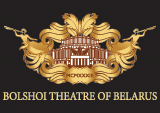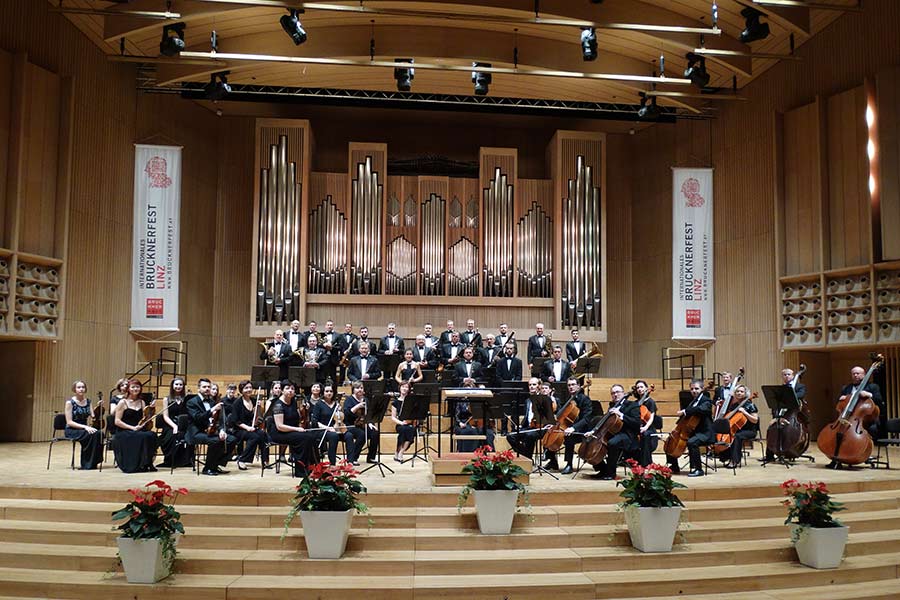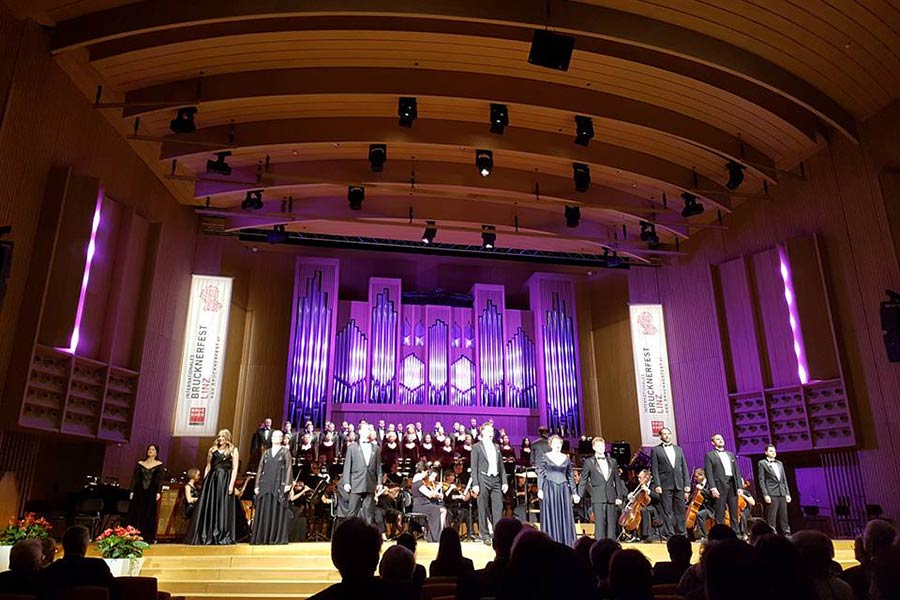 Bolshoi Theatre of Belarus
Bolshoi Theatre of Belarus
Bolshoi Theatre of Belarus
Bolshoi Theatre of Belarus
 Bolshoi Theatre of Belarus
Bolshoi Theatre of Belarus
Bolshoi Theatre of Belarus
Bolshoi Theatre of Belarus
┬Ā
The Bolshoi Theatre of Belarus performed at the prestigious music venue, the concert hall Brucknerhaus, for the first time
At the beginning of October more than 100 Belarusian artists went to Austria to take part in the festival, which is held in Linz in honour of the composer Anton Bruckner annually. Each time since 1974, when the first addition of the music festival was held, the organizers have tried to do something special that would distinguish this event from all others.
And this festival was really special, because for the first time the audience of Brucknerhaus was able to see Belarusian artists ŌĆō opera singers, chorus singers (Principle Chorus Master ŌĆōthe People's Artist of Belarus, recipient of the Francysk Skaryna Medal, laureate of the State Prize of the Republic of Belarus Nina Lomanovich) and orchestra of the Bolshoi Theatre of Belarus. The recipient of the Francysk Skaryna Medal Andrei Galanov will conduct both nights. On October 1 the audience heard Serenade for Strings by Pyotr Tchaikovsky, Symphony No. 1 in D major (Classical Symphony) by Sergei Prokofiev, scenes and arias from operas Ruslan and Lyudmila by Mikhail Glinka, Eugene Onegin and The Queen of Spades by Pyotr Tchaikovsky, Boris Godunov by Modest Mussorgsky, Aleko by Sergei Rachmaninoff.
On 2 October a concert version of Iolanta by Pyotr Tchaikovsky was presented in the 1st part. The performance will feature the People's Artist of Belarus, laureate of the State Prize of the Republic of Belarus Anastasia Moskvina as Iolanta; winner of international competition, recipient of the Francysk Skaryna Medal Eduard Martyniuk as Vaud├®mont; winner of international competitions, recipient of the Francysk Skaryna Medal Ilya Silchukov as Robert; Honoured Artist of the Republic of Belarus, recipient of the Francysk Skaryna Medal Andrey Valenty as Ren├®; Honoured Artist of the Republic of Belarus, laureate of the State Prize of the Republic of Belarus Stanislav Trifonov as Ibn-Hakia. The 2nd part will present cantata Songs of Kursk by Georgy Sviridov for the chorus and the symphony orchestra, as well as scenes from the Prince Igor by Alexander Borodin (finale of the 1st act and Polovtsian Dances).
ŌĆśIolanta is a challenging role,ŌĆÖ admitted Anastasia Moskvina. ŌĆśAccording to the story this is a young, quivering girl, but very young soloists canŌĆÖt sing this role. It is for a stronger voice. I would say it is for dramatic soprano. So I continue to work on the sound quality, performing Iolanta. It must be heavenly, almost angelic. And the concert version of course differs from the performance. There is no decoration; it all depends on your voice skills. Besides you are constantly on stage and can't afford to relax. You always must be in the role, because the eyes of the audience are upon you. And you must show the maximum. For singers, it is a serious endurance and even psychological stability experience.ŌĆÖ
But our brilliant artists were very good at the festival and it was proved by incessant applause and shouts ŌĆśBravo!ŌĆÖ. There is no doubt that this performance of the Bolshoi Theatre of Belarus at the festival in Linz was not the last.
Press about the performance of the Bolshoi Theatre of Belarus:
Brucknerfest: Bolshoi-Theater f├╝hrte Tschaikowsky-Oper ŌĆ×IolanthaŌĆ£ konzertant auf
Anastasia Moskvina, Solistin des Bolshoi-Theaters
Von Georgina Szeless
Das Hauptwerk des rein aus russischer Musik bestehenden Programms war Tschaikowskys au├¤erhalb von Russland kaum beachtete einaktige Oper ŌĆ×IolanthaŌĆ£, deren konzertante Auff├╝hrung durch Orchester, Chor und Solisten des Bolshoi Theaters der Republik Wei├¤russland begeistert in Linz aufgenommen wurde. Leider von zu wenig Besuchern im Gro├¤en Saal des Brucknerhauses, die Montagabend umso heftiger auf das Dargebotene reagierten.
Tschaikowskys Rang als Komponist von immerhin zehn Opern leidet vielleicht etwas unter der Popularit├żt seines umfangreichen Schaffens an Symphonien, Kammermusikwerken, Liedern oder anderer Musik. Auch ├╝berragen seine zu den besten Opern geh├Črenden ŌĆ×Eugen OneginŌĆ£ oder ŌĆ×Pique DameŌĆ£ das stark von Lyrismen bestimmte letzte B├╝hnenwerk des Russen, oder ist vielleicht auch die Schw├żche des Librettos zu ŌĆ×IolanthaŌĆ£ vom Bruder des Komponisten schuld an der Vernachl├żssigung? Das St├╝ck spielt im Mittelalter und erz├żhlt frei nach einem d├żnischen Theaterst├╝ck von einer sch├Čnen K├Čnigstochter, die blind ist, ohne es zu wissen, und die der Vater von der Au├¤enwelt versteckt, damit sie ihre Krankheit nicht erf├żhrt. Als sie von einem Grafen ├╝berrascht wird, in dessen Stimme sie sich verliebt, gelingt dem Arzt das Wunder der Heilung. Sehend schlie├¤t sie den Grafen in die Arme, auf einen f├╝r sie bestimmten Herzog verzichtend.
Die besten Stimmen des renommierten Hauses
Tschaikowsky erlebte knapp ein Jahr vor seinem Tode 1893 die St. Petersburger Urauff├╝hrung, die gro├¤en Erfolg hatte. Die Presse meinte es nicht so gut mit dem Werk. F├╝r diesmal soll dies nicht z├żhlen. Bedauerlich war nur, dass die Namen der S├żnger im Programmheft ungenannt blieben und man nur mit Vorkenntnis die Zuteilung der ohnehin wenigen Rollen f├╝r Sopran, Tenor, Bass und Mezzo schaffte. Es wurde nat├╝rlich russisch gesungen, sicher von den besten Stimmen aus dem erst 2009 neu er├Čffneten Haus mit einem Repertoire von ├╝ber 60 weltbekannten Opern. Auch das Orchester des Bolshoi-Staatstheaters z├żhlt zu den renommiertesten Klangk├Črpern der ehemaligen Sowjetunion. Der etwa 80-k├Čpfige Chor erwies sich ebenfalls als Aush├żngeschild. Ohne Showgeste mit sp├╝rbarer Ehrfurcht vor dem Werk f├╝hrte den hoch qualifizierten Apparat Andrei Galanov am Pult bei einer Musik, deren Farbigkeit und fast impressionistische Feinheit der Harmonik faszinieren, man nehme nur den zart instrumentierten Lichthymnus der Arie des Grafen.
Einen nicht uninteressanten Beitrag aus Russlands Gegenwartmusik bildeten die ŌĆ×Kursker LiederŌĆ£ von Georgy Swiridow (1915-1998), immerhin einem Schostakowitsch-Sch├╝ler. Und nicht blo├¤ als Programmf├╝ller gelang den G├żsten danach ein Ausschnitt aus Borodins einziger Oper ŌĆ×F├╝rst IgorŌĆ£ mit dem Finale des 1. Aktes und den mit unwahrscheinlichem Einsatz von Temperament und russischer Ausgelassenheit servierten ŌĆ×Polowetzer T├żnzenŌĆ£. Gro├¤er Jubel.
******

